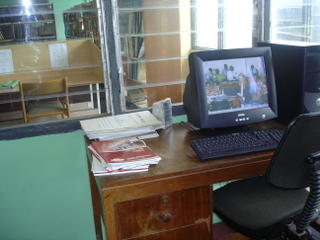
By the way, this is not my office, but a library in one of the ministries in Ghana. I just thought it's nice to continue with a picture for each posting.
I have some articles I read which I found interesting, and the blog is an opportunity to review them and draw out the main points. One of my questions on technology is whether you can reach a level of virtual community of practice with a substantial impact on actual practice of the members. (I seem to doubt this). The article by Christhopher Lueg with the title as in this post http://www-staff.it.uts.edu.au/~lueg/papers/commdcscw00.pdf is very useful for this question. He argues that the transfer of a concept that is deeply rooted in the lived-in world (like community of practice) to the virutal involved conceptual problems, such as the question where learning and doing are to happen in the virtual world. He looks at the newsgroup de.rec.bodyart which has similarities with communities of practice in that learning how to behave, developing a certain attitude and knowing about specific aspects are important for being a full member. Examples are shared anecdotes like pierced and inked persons denounced as disoriented by the German government (he, Germany again? still subconsciously influenced by my visit to Berlin? :)). Anyhow, in addition meetings are organized where members meet physically to discuss mostly bodyart-related topics. Yet, it would still be a virtual community of practice as the main medium is the newsgroup. Knowledge acquired online is manifested in the real world. Yet, it makes it unclear whether there is a 'shared practice'. His conclusion is that careful investigation is required when interpreting virtual communities as communities of practice and where learning and doing are located in the virtual.
I would indeed like to know more about where the virtual learning actually takes place and how it transpire into the real world. I think it depends on the practice of the community how important face-to-face interactions will become for learning. When interpersonal skills are important for the practice, I can imagine face-to-face interaction is more important to create really a form of shared practice.

Great to see you here in the virtual world Joitske! I think EW would say that people belong to a community not to a newsgroup ...
ReplyDeletePersonally, I don’t find communities where both learning and doing are located in the virtual world particularly interesting – if the learning doesn’t result in some “doing” in the real world I wonder how useful it is going to be to study such a community.
ReplyDeleteIn addition, I think a more useful example of a Usenet group involving informal online learning and a shared culture allied with real world practice at a variety of levels (student, hobbyist, professional, international star) might be the jazz guitar group RMMGJ http://groups.google.com/groups?hl=en&lr=lang_en&ie=UTF-8&group=rec.music.makers.guitar.jazz
which has been active for about 8 years.